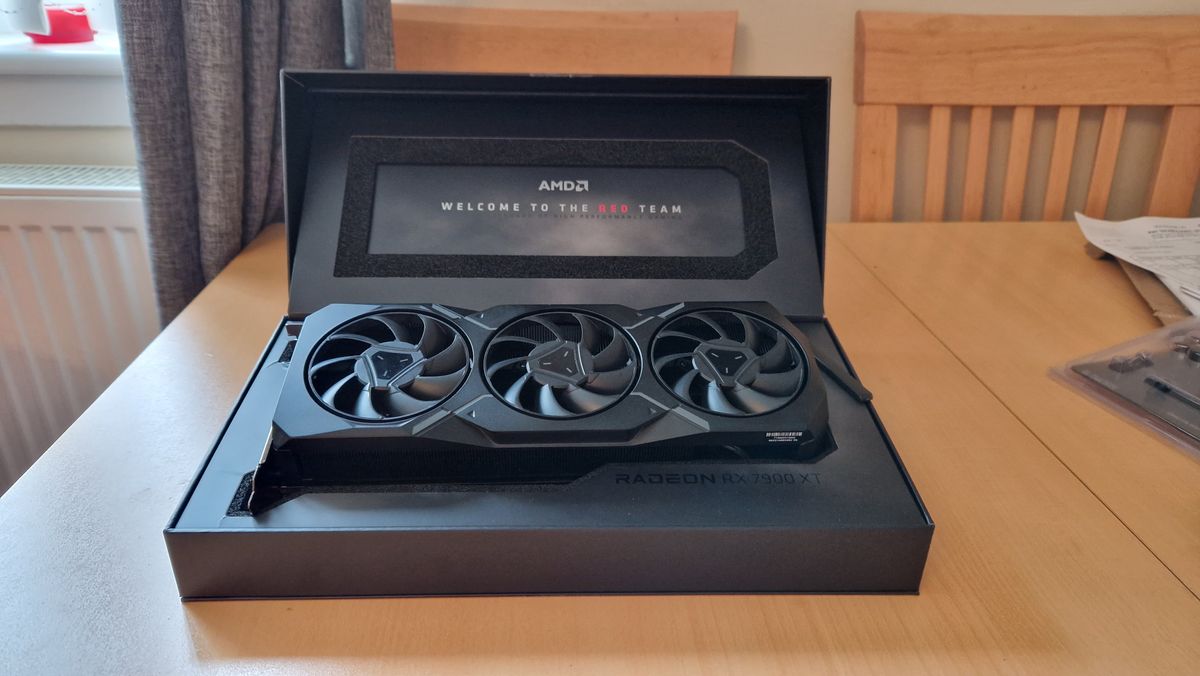12DOVE Verdict
The AMD Radeon RX 7900 XT is another strong GPU offering that performs brilliantly in 4K, and at a more affordable price than the competition. It feels like it lacks a distinct market position though, since its beefier sibling offers better performance for not much more money. Having said that, this is a top-performing GPU that shouldn't fly under your radar.
Pros
- +
Great 4K performance
- +
More affordable than the RTX 4080
Cons
- -
Nvidia has superior software
- -
The 7900 XTX offers better performance for only ~$150 more
Why you can trust 12DOVE
The AMD Radeon RX 7900 XT is another strong high-end GPU that performs brilliantly at a more affordable price than the competition. It suffers from the same (slight) weaknesses as the 7900 XTX, although with slightly less power, these are a bit more noticeable. Regardless, this is a top-drawer GPU that offers performance well within the realms of an RTX 4080 for significantly less money.
At an MSRP of only $899 in the US and a lowest price of £859 in the UK, the 7900 XT comes in only ~$150 cheaper than the XTX. While this is great for the folks who want one of the best graphics cards on the market at the lowest possible price, it does feel to me that the 7900 XT lacks a distinct identity. Having said that, it does successfully undercut the RTX 4080, which sits at an MSRP of $1,199, but usually ends up costing a few hundred more on both sides of the pond.
The RX 7900 XT will transform an average rig into one of the best gaming PCs possible if budgets simply can't be stretched. However, it's hard to imagine that someone buying a high-end GPU at this type of price couldn't, and wouldn't want to save $150 more. That makes the RX 7900 XTX a much more tempting prospect, and the 7900 XT harder to recommend.
Design and Features
The AMD Radeon RX 7900 series was designed with one thing in mind. Offering the best GPU performance imaginable for under a grand. Or, to put it another way, to undercut the price of Nvidia's flagship RTX 40 Series GPUs while not compromising on power.
Besides weighing in a bit lighter than the RX 7900 XTX, this is essentially the same package. On the underside of the GPU, you have three fans keeping the board cool. In terms of connectivity, you have two DisplayPort bays, one HDMI, and one USB-C. I said the same with the XTX, but again, I'd have liked a second HDMI connection to play with here. It's hardly a major problem, but I think it would have been a nice touch over the competition, particularly for the budget buyers these GPUs attract, who, in all likelihood, can't afford two of the best gaming monitors on the market.
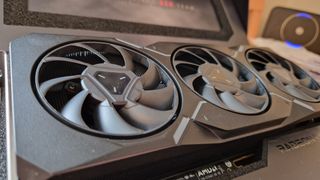
As standard in this generation of AMD's GPUs, you have RDNA 3 architecture, which uses the brand's chiplet knowledge to leverage more power for less money. The board runs on the AMD Radiance Display Engine, which is a big reason why DisplayPorts are favored. This feature essentially allows higher maximum refresh rates at higher resolutions.
RDNA 3 isn't as efficient as DLSS 3, but the addition of Ray Accelerators does help to give the 7900 XT an efficiency boost in raytracing workloads. This is absolutely noticeable when we look at benchmarking tests later, but doesn't quite match up to Nvidia's latest AI deep learning tech.
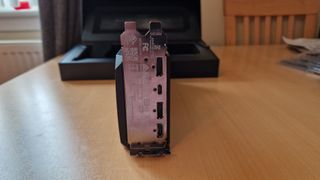
Similarly, where Nvidia's software is the yardstick for a lot of components in the PC market, AMD's drivers are almost just as conclusive. There are handy profiles on board that allow you to fine-tune performance and settings across the board. There's AMD Super Resolution, which gives a bit more of a noticeable boost to this card than it does the XTX. All in all, I do like AMD's software, and I found it was more of a help when testing this GPU than it was with the XTX. The superior power on offer with that card meant I didn't have to rely on software and didn't feel it helping as much. That said, Nvidia's Lovelace architecture, DLSS3, superior Ray Tracing, and conclusive software do have AMD beat as an all-round package.
With the RX 7900 XT we have 80MB of 2nd Generation AMD Infinity Cache on a 320-bit memory bus. This is slightly less than the XTX, which has 96MB on a 384-bit memory bus. Likewise, the 7900 XT makes do with 20Gbps GDDR6 memory. This delivers 2912 GB/s of bandwidth to the XTX's 3494.4 GB/s. The 7900 XT's 20GB of memory reduces slightly from the XTX's 24GB. Compare either to the RTX 4080's 16GB though, and you see the extreme value for money come into play.
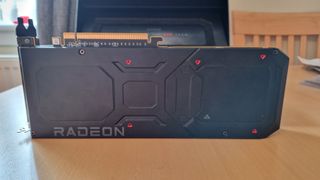
Performance
There's no way around it - the RX 7900 XT is definitely a step down compared to the 7900 XTX. It certainly isn't as powerful as the RTX 4090, which is designed for a lot more than just gaming. On the other hand, the XT still offers some staggering 4K performance with excellent frame rates. When you think of the amount of money people have paid for RTX 3080 GPUs in recent years which offer less powerful tech and similar 4K performances, it really drives home how incredible the performance-to-price ratio is in AMD's 7900 series. Make no mistake, these are some of the best value GPUs on the market, and if you're thinking of an upgrade from the 30 series, this shouldn't be written off.
In benchmarking tests, the RX 7900 XT performed really solidly, earning legendary scores in 3DMark, and impressively high scores in Geekbench's GPU compute tests. You can see how the 7900 XT performed in the table of results below, and compare it to the 7900 XTX's performance in the same tests.
| Row 0 - Cell 0 | 3DMark Time Spy (GPU scores) | 3DMark Fire Strike | Geekbench OpenCL GPU Compute | Geekbench Vulkan GPU Compute |
| AMD Radeon RX 7900 XT | 24 326 | 40 425 | 193584 | 202062 |
| AMD Radeon RX 7900 XTX | 28 011 | 40 392 | 222987 | 209630 |
So as you can see, these scores aren't too far off the XTX. Both GPUs were scored alongside our testing rig's Intel i7 12700-K CPU, for reference. But how does this translate to gaming in 4K at max settings? See the tables below for how both GPUs did.
| Row 0 - Cell 0 | 4K Max Settings | Ray-Tracing | FPS |
| Marvel's Guardians of the Galaxy | ✔ | ✔ | 75 |
| Metro: Exodus | ✔ | ✔ | 72 |
| HUNT: Showdown | ✔ | Row 3 - Cell 2 | 95 |
| Apex: Legends | ✔ | Row 4 - Cell 2 | 160 |
| The Finals (Closed Beta) | ✔ | ✔ | 87 |
| Row 0 - Cell 0 | 4K Max Settings | Ray-Tracing | FPS |
| Marvel's Guardians of the Galaxy | ✔ | ✔ | 120 |
| Metro: Exodus | ✔ | ✔ | 96 |
| HUNT: Showdown | ✔ | Row 3 - Cell 2 | 120 |
| Apex: Legends | ✔ | Row 4 - Cell 2 | 180 |
| The Finals (Closed Beta) | ✔ | ✔ | 115 |
Although these 4K performances from the 7900 XT are a level below the XTX, they're still great for a GPU under a grand. Keep in mind, too, that these are 4K max settings results. At 1440p, or with slightly reduced settings, the 7900 XT will produce some really competitive frame rates. At 1440p, the XT pushed HUNT: Showdown up to 115fps, and Apex up to 210fps - more than enough for competitive players of either game.
Visuals and lighting in all of the games I tested with this card looked stunning. These were true 4K scores and besides some more fluctuant frame rates across the board, I was really happy with how the RX 7900 XT performed in comparison to the XTX.
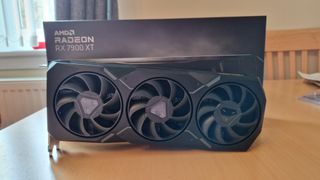
Should you buy the AMD Radeon RX 7900 XT?
Writing this review has honestly felt a bit repetitive. I reviewed the 7900 XTX last week, and it had a lot of the same strengths, weaknesses, and caveats - hell, even the pictures look eerily similar. The RX 7900 XT is a great GPU that I can easily recommend. It packs a powerful performance punch and does so at the most competitive price on the market for a new-gen GPU. For that, I really do believe it needs to be applauded.
However, I do feel that this GPU lacks a distinct identity - a reason to buy it over the 7900 XTX, especially seeing as that card is only around $150 pricier but offers much more stable 4K frame rates. If stock issues present themselves, then this is a great choice, but it's hard to recommend if someone's budget can stretch a little further. Either way, it's definitely one of the best value cards on the market.
Ultimately though, if you can afford to spend that little bit more, the 7900 XTX is undoubtedly the graphics card to go for.
How we tested the AMD Radeon RX 7900 XT
The AMD Radeon RX 7900 XT was our testing rig's GPU for about a week, following on from our tests and review of the RX 7900 XTX. I compared the two closely for the duration of my time with it and was pleasantly surprised with how it performed.
For benchmarking I used 3DMark's Time Spy and Fire Strike tests, as well as Geekbench's GPU compute tests. In terms of gameplay, I put the 7900 XT through its paces by playing plenty of The Finals closed beta, and HUNT: Showdown. I also played Marvel's Guardians of the Galaxy, Apex Legends, and Metro Exodus to record frame rates in varying technical demands.
For reference, our testing rig has a Gigabyte Z690 Gaming X motherboard, PNY XLR8 DDR5 RAM, an RM1000X power supply, and an Intel i7-12700K CPU.
To read more about how we test the latest gaming technology at GamesRadar, take a gander at our Hardware Policy.
Why not go for a cheaper upgrade for your gaming PC? There are cost of living crises going on after all. Here are our lists of the best CPUs for gaming, the best SSD for gaming, and the best RAM for gaming.
One of my earliest memories is playing SuperMario64 and wondering why the controller I held had three grips, but I only had two hands. Ever since I've been in love with video games and their technology. After graduating from Edinburgh Napier University with a degree in Journalism, I contributed to the Scottish Games Network and completed an Editorial Internship at Expert Reviews. Over the last decade, I’ve been managing my own YouTube channel about my love of games too. These days, I'm one of the resident hardware nerds at 12DOVE, and I take the lead on our coverage of gaming PCs, VR, controllers, gaming chairs, and content creation gear. Now, I better stop myself here before I get talking about my favourite games like HUNT: Showdown, Dishonored, and Towerfall Ascension. Location: UK Remote

Ahead of GTA 6, Take-Two CEO says he’s “not worried about AI creating hits” because it’s built on recycled data: “Big hits […] need to be created out of thin air”
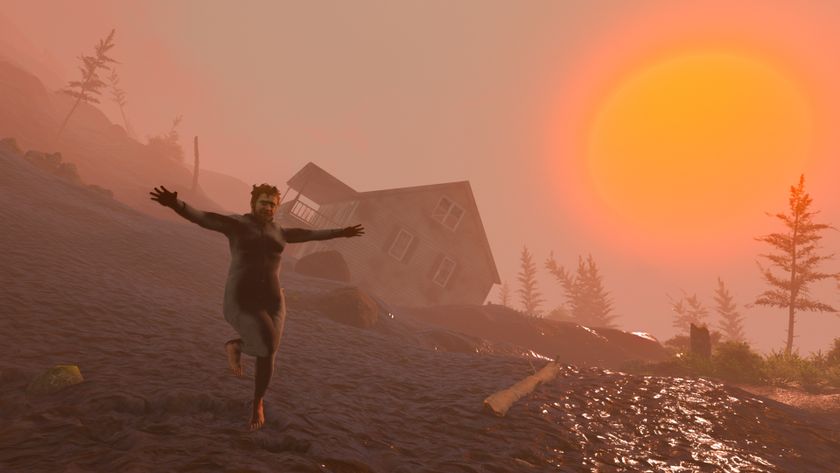
Getting Over It creator Bennett Foddy threatens the world once again: If you want Baby Steps to be a brutal rage game, "you can inflict that on yourself"

A Simpsons Hit and Run Remake will probably never happen – and I don't want it to
